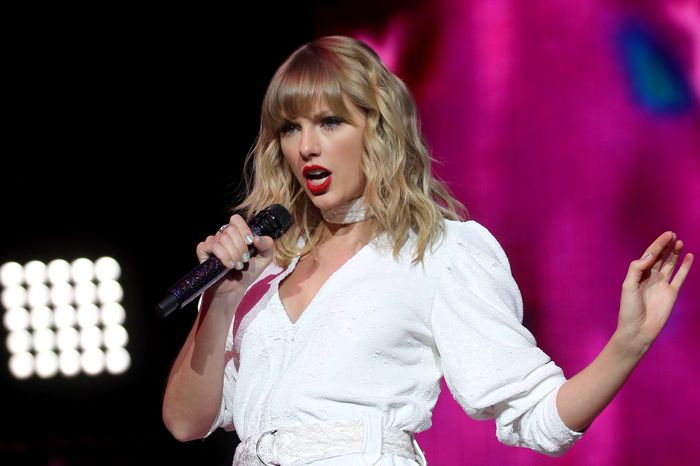
A couple of years ago, Lauren Michele Gotthelf found herself in the same federal courtroom where Taylor Swift’s 2018 sexual-assault trial had been held. Gotthelf prefers not to get into the details of whom she was suing, but suffice it to say that it was a difficult experience, and Swift’s music helped her through it. “When I would walk into court, I would play Reputation’s ‘…Ready for It?’ just to get pumped up,” she recalled. Naturally, when Swift announced her first concert tour in five years, Gotthelf was determined to go. She managed to get tickets, but the experience was so unpleasant that she is now among the Swifties who are taking legal action against Ticketmaster for its botched handling of the Eras Tour presale. Swift “was victimized once again, in my opinion,” Gotthelf told Vulture. “And I think that her entire fan base was victimized as well with a ticket monopoly that should have never, ever been able to do this.”
According to a 33-page lawsuit submitted in Los Angeles on December 2, fans are accusing the ticket-selling company of fraud, price fixing, and antitrust violations. They allege that Ticketmaster misrepresented parts of the presale process and “intentionally and knowingly” allowed scalpers and bots to access tickets in order to profit off resale fees. The lawsuit also claims that Ticketmaster has agreements with stadiums, forcing artists with large audiences to work with the company regardless of their desire to provide affordable prices for their fans. Ticketmaster did not reply to Vulture’s request for comment.
Twenty-six plaintiffs were named in the initial complaint, and attorney Jennifer Kinder told Vulture on Monday that more than 200 other people have since reached out, though not all of them have completed the paperwork to be officially added as plaintiffs. The lawsuit asks Ticketmaster to pay a $2,500 fine for every civil violation (which could amount to millions given the number of people who wanted tickets) in addition to awarding plaintiffs triple the amount of their damages. “If we don’t stand up to how Ticketmaster operates, nothing is ever going to change,” said Kinder, a Swiftie (and mother to an 11-year-old Swift fan) who’s stayed engaged with other fans on social media throughout the presale’s aftermath. In fact, many of the initial plaintiffs found out about the lawsuit through TikTok, where Kinder has been posting updates under the handle @badbitchlaw.
This is not a class-action lawsuit, which means any potential damages will be based on each plaintiff’s own experience during the presale. Additionally, plaintiffs won’t have to pay any legal fees if the lawsuit isn’t successful. Kinder’s law firm is inviting anyone affected to get involved by filling out a form or contacting the law firm directly.
According to Ticketmaster, 2.4 million tickets have been sold for Swift’s Era Tour. Ahead of the November 15 presale, Ticketmaster offered a preregistration system that it said would identify “verified fans,” which resulted in several frustrating scenarios. Some people claim they were informed they would get a code but never did — even those who were supposed to be “boosted” ahead in line because they had tickets to Swift’s previously canceled Lover Fest. Others waited in the queue for hours but couldn’t click on disappearing tickets fast enough (one plaintiff’s credit card was charged around $14,000 for more than 40 failed checkout attempts). Many who did manage to secure tickets had to pay much higher prices than were originally advertised, and prices on resale sites have only continued to skyrocket.
A day after a Capital One presale on November 16 presented similar frustrations for fans, Ticketmaster announced that the scheduled general sale had been canceled because of “extraordinarily high demands on ticketing systems and insufficient remaining ticket inventory.” For her part, Swift has said she was “assured” the demand could be handled and expressed anger that many of the 2.4 million people who ended up netting Eras Tour tickets “feel like they went through several bear attacks to get them.” The company later apologized to Swift and her fans in a blog post, noting that record-breaking sales, bot attacks, and fans who didn’t have codes broke parts of the website. Per Reuters, the company previously denied any anti-competitive practices and claimed it never violated a consent decree with the Department of Justice after its 2010 merger with Live Nation.
Katy Johnson, a plaintiff who received a presale code but failed to get tickets after waiting six to seven hours, told Vulture that she feels like some coverage of the presale has “mocked” Swifties as hysterical for being upset about tickets. She said the focus should instead be on whether Ticketmaster was behaving in a fair, legal way. “Ticketmaster knew how many codes they gave out,” Johnson said. “They knew what codes were for what shows. It just feels like they knew exactly what was going to happen and they let it happen or encouraged it to happen.”
Some fans have expressed concern over whether it’s actually possible to sue Ticketmaster because of the terms built in at checkout. But Kinder said she’d want to present a judge with the TikToks that Swifties posted about the presale, which she said show consumers had no time to read what they were agreeing to. “The case law is pretty clear,” Kinder said. “If it’s oppressive, that contract, that waiver, can be nullified. I don’t know exactly what Ticketmaster is going to throw at me, but I don’t think anything that was signed is valid.”
This lawsuit isn’t the only form of action being taken against Ticketmaster. Another group of Swifties has been encouraging people to file complaints with the Federal Trade Commission and email their state’s attorney general about the presale debacle. Meanwhile, several elected officials, including New York representative Alexandria Ocasio-Cortez and Minnesota senator Amy Klobuchar, have criticized Ticketmaster as a monopoly, and the Justice Department has reportedly initiated an investigation that predates the Eras Tour.
Regulatory bodies have the power to do serious damage to Ticketmaster and Live Nation — potentially breaking it up, even — in a way that a private lawsuit might not be able to. But Kinder argues that change is a collective effort, pointing to asbestos cases that were litigated in courtroom proceedings before governments took action. She’s particularly excited about the discovery process of the lawsuit, which she said would entitle her team to details about Ticketmaster’s algorithms, back-end programming information, and the decision-making processes of corporate reps.
“Our hope is that we might discover some information that might be helpful to other ticket holders, to other sales, to government officials,” Kinder said. “And we’re excited and willing to share that information so that we can make a more transparent consumer process.”
That could also benefit other artists, she noted. As many fans have pointed out, it seems likely similar ticketing challenges will arise for Beyoncé’s upcoming tour for Renaissance if Ticketmaster doesn’t change its process. “There are lots of passionate fans that exist in our country, and one of the largest is the Beyhive,” Kinder said. “Are they going to get screwed over, too?”





